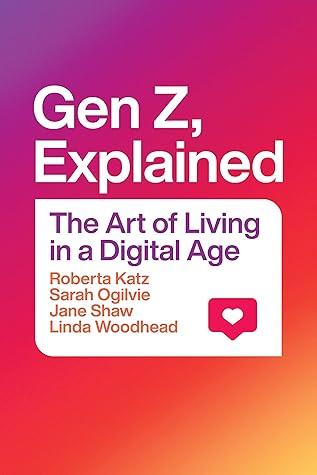Kindle Notes & Highlights
A kindergarten teacher in California, who has been teaching for twenty years, reported to us that she had recently noticed a difference in how her five-year-old pupils speak to her—curtly, directly, devoid of respect, courtesy, or politeness.5 She believes this change has occurred because they now see her as a “human Alexa”—an information provider akin to Amazon’s Echo (Alexa),
The increasing focus of postmillennial students on what is relevant to their job and income prospects also raises concerns that they have an instrumental view of education—that they are learning simply to get a job instead of learning for the sake of learning—which can undervalue abstract thoughts and ideas such as those encountered in the study of philosophy or literature.
Some thinkers, notably Jean Twenge, have emphasized the downsides of the digital age and blamed its technologies for harming postmillennials, arguing that they are anxious, depressed, and lonely because they are too engrossed in their devices, too deficient in critical thinking skills, and (a negative for Twenge) too communal in their work habits.
She went on to say that those who do not understand their position of privilege can often be “really offended if you try to call them out on something.” Both Lancaster University and a university in America she had attended before going to England are “pretty white,” and “not all people like to acknowledge white privilege as it makes them uncomfortable.” She experiences this as a “difficult topic that causes tension,” so sometimes she tries to avoid such discussions, while recognizing that such avoidance is a privileged thing to be able to do
It is part of the privilege of the dominant ethnic group not to have to identify according to ethnic markers.
It is widely understood among Gen Zers that parents and grandparents were more constrained in their choices and more hemmed in by social and familial expectations.
This mark of generational difference may also be partly ascribed to the exploration that has been possible online for postmillennials for the whole of their lives, whereas
the postmillennials’ parents, when they were young, were not able to explore their identities through such online immersion.
Of course, there is nothing new about tensions between parents and children, and difficulties in coming out, but what stands out here is that those tensions are explicitly articulated in terms of authenticity and genuineness, as opposed to shame or embarrassment (although those feelings may exist as well).
“cancel culture is best treated like a collective decision to minimize the cultural influence a person and their work have moving forward.”18 This is about the power of collective voice
to challenge and drown out what they perceive as prejudice in favor of showing empathy and support for vulnerable communities.
The satirical and cynical expression, said or written with something of a mental eye roll, also expressed postmillennial discontent with their inheritance from older generations, as well as their frustration that boomers don’t seem to “get it”—that the huge responsibility of fixing boomer mistakes and building a better world now rests heavily on Gen Zer shoulders.
For some Gen Zers, catching feelings in a dating or sexual relationship is something to guard against. In our iGen Corpus, these sentiments were most salient on Twitter: “Catching feelings hella fast. This is so dangerous” [@Sydney_godfrey]; “When I start catching feelings, I get sad” [@111amandali]; “Do you ever just feel yourself catching feelings for someone and you’re like, no! Stop! What’re you doing!” [@aamberrleigh]; “Fucked around, caught feelings & got hurt” [@Yo_Girl_Chiina]. The ambivalence was well expressed by one of the students we interviewed, who said, “If I was a boy, I would
...more
The internet has transformed how we meet each other, and this has added to the category confusion about what a relationship, friendship, or hookup might be and mean.26
I mean, as a generation, I’d say most people believe in accepting gay people. That goes against most religions. Our generation believes in sex without relationships. That goes against most religions. One thing, we just swear a lot, you know. . . . I feel like our values conflict too much with religions for people to be able to like it. Plus, I don’t know, we just grew up with technology and a lot of science and stuff and it’s hard to believe in made-up things, when it’s all presented to you. [Noah]
follow.” Pointing out that “it literally goes against most of what’s in the Bible to be this terrible towards gay people,” she affirmed the possibility of doing things differently, and went on to say that “I don’t like religion as an institution per se when it doesn’t emphasize what the Bible is actually saying . . . or it just takes little nitpicky sections of it and tries to make them this whole big issue” [Malia].
They do not expect to do better than their parents, in contrast to the expectations of prior generations, and they worry about climate change, racism, injustice, and gun violence—issues they believe their elders should have addressed. They are for the most part disappointed or, in some cases, angered by the hypocrisy, racism, misogyny, and homophobia of the past. They believe that, thanks to the errors of predecessor generations, they are facing a future of hard work to repair damaged social institutions.


